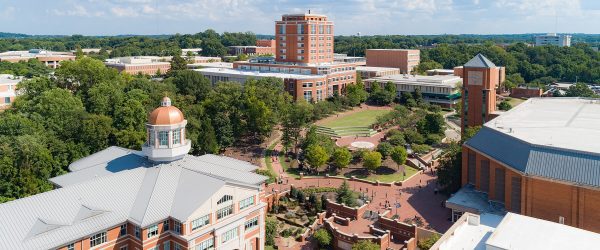Roadmap to R1 Carnegie Classification

On Oct. 20, 2020, UNC Charlotte announced the launch of a strategic planning process that will set the University’s strategic direction for the next five to 10 years. One goal mentioned consistently during initial discussions is to join the ranks of the nation’s elite research institutions by obtaining the highest Carnegie Classification research designation or “R1, very high research status.”
To achieve this goal, UNC Charlotte must develop a long-term strategy for investment and growth that will build upon the University’s unique faculty strengths and assets, and target all aspects of the research enterprise. These include research expenditures, the size of our research staff and faculty, and the number of doctoral degrees conferred. The potential outcomes of holding R1 status include enhanced institutional reputation and prestige both regionally and nationally, the potential for increased investment (through government and industry), greater success in winning federal awards and increased ability to attract and retain high-quality faculty and students.
To help guide and inform the current campus-wide strategic planning effort, Chancellor Gaber has asked Rick Tankersley, Ph.D., vice chancellor for Research and Economic Development, to chair a committee of 25 faculty members and administrators to develop a roadmap for achieving Carnegie R1 status. The charge for this “R1 Commission” includes:
- Review the Carnegie Classification methodology, conduct a comprehensive gap analysis to determine where we might be lagging in our pursuit of R1 status and recommend strategies aimed at boosting research activity.
- Evaluate our current portfolio of research, scholarship and creative and performing arts activities and select several core areas of interdisciplinary research excellence that represent existing and emerging areas of strength, national prominence and distinction.
The Niners who have agreed to join Tankersley on this Commission are:
- Kirill Afonin, associate professor, Chemistry (CLAS)
- David Bellar, chair, Kinesiology (CHHS)
- Cheryl Brown, chair, Political Science & Public Administration (CLAS)
- Blaine Brownell, director, School of Architecture (CAA)
- Valerie Crickard, executive director, Grants and Contracts Administration (RED)
- John Daniels, chair, Civil and Environmental Engineering (CoEN)
- Nancy Gutierrez, dean (CLAS)
- Scott Kissau, interim associate dean, Research & Graduate Education (CoED)
- Richard Lambert, professor, Education, Education Leadership (CoED)
- Heather Lipford, interim associate dean for Research (CCI)
- Mike Mazzola, director, EPIC (CoEN)
- Valerie Mazzotti, professor, Special Education & Child Development (CoED)
- Fatma Mili, dean (CCI)
- Brigid Mullany, professor, Mechanical Engineering (CoEN)
- Elizabeth (Beth) Racine, professor, Public Health Sciences (CHHS)
- Lisa Rasmussen, professor, Philosophy (CLAS)
- Adam Reitzel, professor, Biological Sciences (CLAS)
- Samira Shaikh, assistant professor, Computer Science (CCI)
- Elizabeth (Liz) Siler, interim associate dean for Collection Services, Library (AA)
- Elizabeth Stearns, professor, Sociology (CLAS)
- Peter Szanton, director, Office of Research (CLAS)
- Brett Tempest, associate professor, Civil and Environmental Engineering (CoEN)
- Lori Thomas, director, Research and Faculty Engagement (Urban Institute)
- Byron White, associate provost, Urban Research & Community Engagement (AA)
- Dongsong Zhang, Belk Endowed Chair, Business Information Systems & Operations Management (CoB)
The Commission will start its work this week with the goal of wrapping up its efforts by early March.